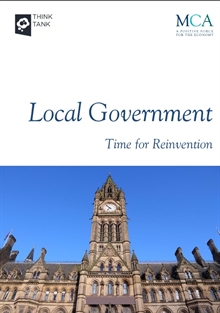23.02.15
Getting localism right
Paul Connolly, director of the Management Consultancies Association Think Tank, discusses its new report, ‘Local Government – Time for Reinvention’, based on the views of the UK’s leading consultants – experts in local government – working with councils the length and breadth of the country.
The near-universal default answer to the problems facing councils is ‘localism’. It has much to commend it. Councils are close to the communities they serve. Smaller than Whitehall departments and agencies, they are more agile, able to respond faster to citizen demands.
Yet localist theory needs stress-testing, not least by its followers, to ensure it can withstand the current exacting conditions councils face. Getting localism right means addressing the following issues.
Cuts. Councils have borne a disproportionate share of the pain of deficit reduction. On the whole they have done well, reorganising their back offices, collaborating, and engaging in inter-agency working to secure more for less. But deeper cuts are expected in the next Parliament. On current projections, the central government grant to local authorities will disappear by 2020, leaving many councils in dire straits. This will require more than merely localism to address.
Linked to resources is Capacity. Many local leaders want radical devolution. The ‘Manchester Model’ in which the bulk of local service responsibility will be transferred to a Mayor and Executive is an example. Manchester, benefiting from a decade of collaboration with neighbouring authorities, has the institutional ‘heft’ to manage a range of new obligations. But it is questionable whether all councils, including many covering less clearly definable ‘places’ than Manchester, have the necessary infrastructure. Devolution must be accompanied by considerable transfer money, but also of skills and capacity.
Then there is the question of Control. Where capacity or the ‘identity’ of a place make devolution challenging, transferring service responsibility to another agency, or regional or national body, might make operational and financial sense. Indeed, some current local responsibilities, such as those around business regulation, may be better-suited to national organisation. And this does not necessarily mean an end to local accountability. National delivery bodies can easily develop local arms with local governance structures.
Indeed, the assumption that local council control of a service guarantees local accountability is misleading. Turnout in local elections is poor, undermining accountability. Localists argue that transferring more services to local authorities would animate voters. But many services already administered by local councils – aspects of social care, for example – have little bearing on local election outcomes, but are hugely important to users. Giving councils service control is not the same as giving people control.
The critical concept here is Community. Councils have evolved over time, through different reorganisations and initiatives. Their identities often relate to recognisable communities. But often they don’t. Councils often have strange names and curious boundaries. And they are geographically static. People, however, are not easily bounded. In the Digital Age, they are especially mobile, forming fluid communities that relate imperfectly to the geographical basis of UK governance.
To these issues we must add the question of Coherence. Localism is a ‘let many flowers bloom’ philosophy of difference. Quite; places are different. But examination of local responses to the challenges of austerity will reveal both rational (and accountable) variations and unaccountable, preventable incoherence. This is understandable. We lack a shared understanding of local government’s proper scope and responsibilities. Even informed commentators would struggle to define their council’s remit, especially in two-tier areas.
Recent experimentation and innovation in local governance and delivery are welcome, but have brought their own uncertainties. Councils’ scope, structure and purpose, what they are best suited for and what they are ill-adapted to deliver: these are questions on which there is no unanimity.
 The Management Consultancies Association’s (MCA’s) report ‘Local Government: Time for Reinvention’ recommends a conference, early in the next Parliament, to examine what councils are and what they should do, and what works best from the perspective of citizens. Comprising representatives from civil society, as well as local and central government, the conference would develop common principles against which the validity of Manchester-style devolution proposals, as well as different approaches (shared services, regionalisation or national organisation) could be assessed.
The Management Consultancies Association’s (MCA’s) report ‘Local Government: Time for Reinvention’ recommends a conference, early in the next Parliament, to examine what councils are and what they should do, and what works best from the perspective of citizens. Comprising representatives from civil society, as well as local and central government, the conference would develop common principles against which the validity of Manchester-style devolution proposals, as well as different approaches (shared services, regionalisation or national organisation) could be assessed.
The conference would not just look at devolution to councils. For the real test of localism is Citizens: what benefits them. Our report suggests that if communities are better placed to deliver services themselves, they should. These ‘free services’ could serve communities of place, but also those of interest that are not specific to a particular location, in line with how people live in the Digital Age.
Localism remains the most comprehensive answer to local government’s current challenges. But it should be based on a better understanding of what councils are for. In an era of resource scarcity, providing that clarity and definition is now urgent.

(Above: Paul Connolly, director of the MCA Think Tank)